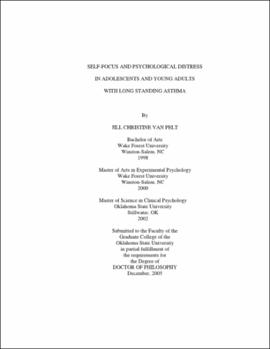| dc.contributor.advisor | Mullins, Larry Lee | |
| dc.contributor.author | Van Pelt, Jill Christine | |
| dc.date.accessioned | 2013-11-26T08:27:46Z | |
| dc.date.available | 2013-11-26T08:27:46Z | |
| dc.date.issued | 2005-12 | |
| dc.identifier.uri | https://hdl.handle.net/11244/6980 | |
| dc.description.abstract | Scope and Method of Study: The purpose of the present study was to examine differences in situational and dispositional self-focused attention between adolescents and young adults with and without a history of childhood asthma. Participants were 81 college students with a history of childhood onset asthma and 81 age- and gender-matched healthy controls. Participants completed measures of depression, anxiety, dispositional self-focus, and situational self-focus. The situational self-focus measure was completed following an experimental task that induced either success or failure. | |
| dc.description.abstract | Findings and Conclusions: Results from the current study indicated that participants with moderate to severe asthma reported higher rates of general psychological distress, depression, and anxiety than participants with mild asthma and age- and gender-matched peers. Participants with and without a history of asthma did not differ in their mean level of dispositional self-focus. Further, in contrast to what was predicted by the current study, participants with and without a history of asthma did not respond differently to experimentally induced failure and they did not demonstrate a differential pattern of self-focused attention following experimentally inducted failure. The current study predicted that, among participants with asthma, increased levels of illness uncertainty would predict psychological distress and that this relationship would be mediated by dispositional self-focused attention. While illness uncertainty was a predictor of psychological distress, dispositional self-focused attention failed to mediate this relationship. As predicted, participants with asthma missed more days from class and work due to health related problems compared to participants without asthma; however, the two groups did not differ on semester or cumulative grade point average. Results from the current study suggest that college students with a history of childhood onset asthma may be more vulnerable to psychological distress compared to age- and gender-matched peers without a chronic illness history and may, therefore, warrant interventions to improve their ability to cope with life stressors. | |
| dc.format | application/pdf | |
| dc.language | en_US | |
| dc.rights | Copyright is held by the author who has granted the Oklahoma State University Library the non-exclusive right to share this material in its institutional repository. Contact Digital Library Services at lib-dls@okstate.edu or 405-744-9161 for the permission policy on the use, reproduction or distribution of this material. | |
| dc.title | Self-focus and psychological distress in adolescents and young adults with long-standing asthma | |
| dc.contributor.committeeMember | Chaney, John M. | |
| dc.contributor.committeeMember | Leffingwell, Thad Ryan | |
| dc.contributor.committeeMember | Winterowd, Carrie | |
| osu.filename | VanPelt_okstate_0664D_1547 | |
| osu.accesstype | Open Access | |
| dc.type.genre | Dissertation | |
| dc.type.material | Text | |
| dc.subject.keywords | asthma | |
| dc.subject.keywords | adolescents and young adults | |
| dc.subject.keywords | psychological distress | |
| thesis.degree.discipline | Psychology | |
| thesis.degree.grantor | Oklahoma State University | |
